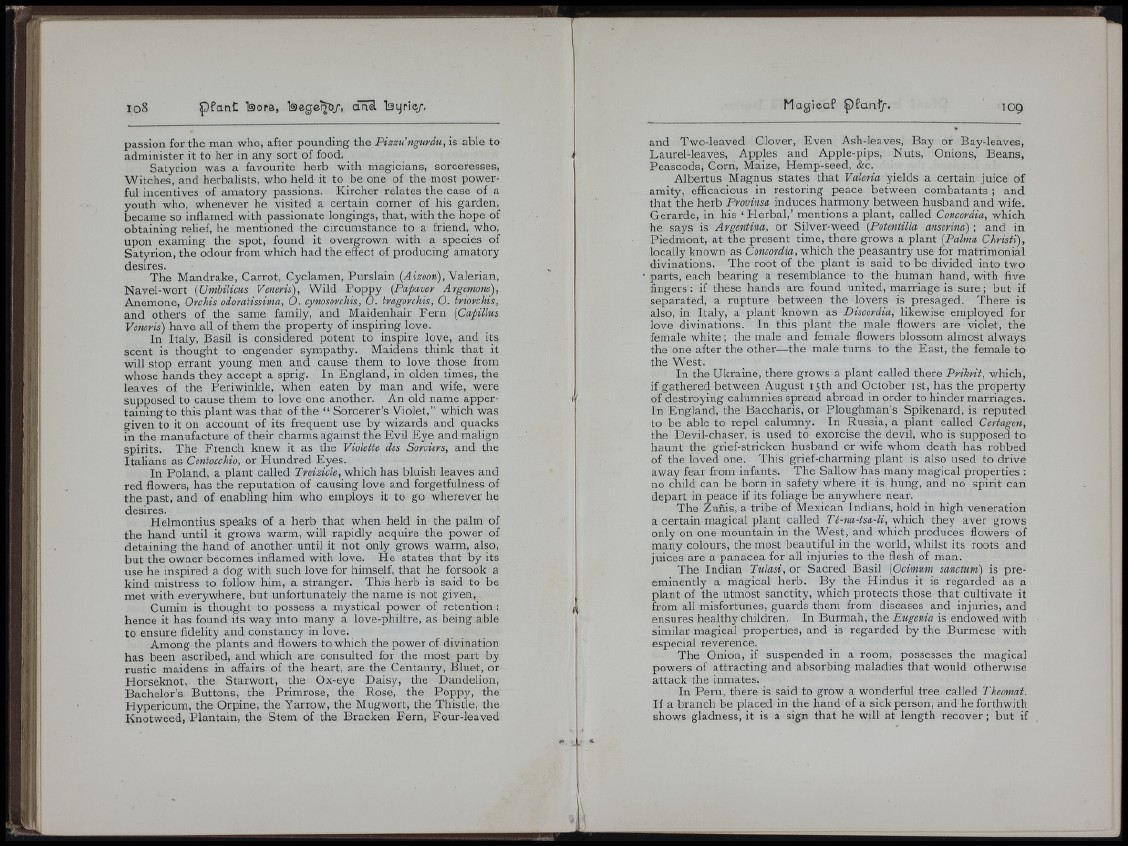
I
s t
passion for the man who, after pounding the Pizzu'ngurdu, is able to
administer it to her in any sort of food.
Satyrion was a favourite herb with magicians, sorceresses.
Witches, and herbalists, who held it to be one of the most powerful
incentives of amatory passions. Kircher relates the case of a
youth who, whenever he visited a certain corner of his garden,
became so inflamed with passionate longings, that, with the hope of
obtaining relief, he mentioned the circumstance to a friend, who,
upon examing the spot, found it overgrown with a species of
Satyrion, the odour from which had the effect of producing amatory
desires.
The Mandrake, Carrot, Cyclamen, Purslain (Zùoow), Valerian,
Navel-wort {Umbilicus Veneris), Wild Poppy {Papaver Argentone),
Anemone, Orchis odoratissima, 0. cynosorchis, 0. tragorchis, 0. triorchis,
and others of the same family, and Maidenhair Fern {CapiUus
Veneris) have all of them the property of inspiring love.
In Italy, Basil is considered potent to inspire love, and its
scent is thought to engender sympathy. Maidens think that it
will stop errant young men and cause them to love those from
whose hands they accept a sprig. In England, in olden times, the
leaves of the Periwinkle, when eaten by man and wife, were
supposed to cause them to love one another. An old name appertaining
to this plant was that of the “ Sorcerer’s Violet,” which was
given to it on account of its frequent use by wizards and quacks
in the manufacture of their charms against the E v il Eye and malign
spirits. The French knew it as the Violette des Sorciers, and the
Italians as Centocchio, or Hundred Eyes.
In Poland, a plant called Troizicle, which has bluish leaves and
red flowers, has the reputation of causing love and forgetfulness of
the past, and of enabling him who employs it to go wherever he
desires.
Helmontius speaks of a herb that when held in the palm of
the hand until it grows warm, will rapidly acquire the power of
detaining the hand of another until it not only grows warm, also,
but the owner becomes inflamed with love. He states that by its
use he inspired a dog with such love for himself, that he forsook a
kind mistress to follow him, a stranger. This herb is said to be
met with everywhere, but unfortunately the name is not given.
Cumin is thought to possess a mystical power of retention :
hence it has found its way into many a love-philtre, as being able
to ensure fidelity and constancy in love.
Among the plants and flowers to which the power of divination
has been ascribed, and which are consulted for the most part by
rustic maidens in affairs of the heart, are the Centaury, Bluet, or
Horseknot, the Starwort, the Ox-eye Daisy, the Dandelion,
Bachelor’s Buttons, the Primrose, the Rose, the Poppy, the
Hypericum, the Orpine, the Yarrow, the Mugwort, the Thistle, the
Knotweed, Plantain, the Stem of the Bracken Fern, Four-leaved
and Two-leaved Clover, Even Ash-leaves, B ay or Bay-leaves,
Laurel-leaves, Apples and Apple-pips, Nuts, Onions, Beans,
Peascods, Corn, Maize, Plemp-seed, &c.
Albertus Magnus states that Valeria yields a certain juice of
amity, efficacious in restoring peace between combatants ; and
that the herb Provinsa induces harmony between husband and wife.
Gerarde, in his ‘ Herbal,’ mentions a plant, called Concordia, which
he says is Argentina, or Silver-weed {Potentilla anserina) ; and in
Piedmont, at the present time, there grows a plant {Palma Christi),
locally known as Concordia, which the peasantry use for matrimonial
divinations. The root of the plant is said to be divided into two
parts, each bearing a resemblance to the human hand, with five
fingers : if these hands are found united, marriage is sure ; but if
separated, a rupture between the lovers is presaged. There is
also, in Italy, a plant known as Discordia, likewise employed for
love divinations. In this plant the male flowers are violet, the
female white ; the male and female flowers blossom almost always
the one after the other—the male turns to the East, the female to
the West.
In the Ukraine, there grows a plant called there Prikrit, which,
if gathered between August 15th and October ist, has the property
of destroying calumnies spread abroad in order to hinder marriages.
In England, the Baccharis, or Ploughman’s Spikenard, is reputed
to be able to repel calumny. In Russia, a plant called Certagon,
the Devil-chaser, is used to exorcise the devil, who is supposed to
haunt the grief-stricken husband or wife whom death has robbed
of the loved one. This grief-charming plant is also used to drive
away fear from infants. The Sallow has many magical properties :
no child can be born in safety where it is hung, and no spirit can
depart in peace if its foliage be anywhere near.
The Zuñis, a tribe of Mexican Indians, hold in high veneration
a certain magical plant called Té-na-tsa-li, which they aver grows
only on one mountain in the West, and which produces flowers of
many colours, the most beautiful in the world, whilst its roots and
juices are a panacea for all injuries to the flesh of man.
The Indian Tulasi, or Sacred Basil {Ocimum sanctum) is preeminently
a magical herb. B y the Hindus it is regarded as a
plant of the utmost sanctity, which protects those that cultivate it
from all misfortunes, guards them from diseases and injuries, and
ensures healthy children. In Burmah, the Eugenia is endowed with
similar magical properties, and is regarded by the Burmese with
especial reverence.
The Onion, if suspended in a room, possesses the magical
powers of attracting and absorbing maladies that would otherwise
attack the inmates.
In Peru, there is said to grow a wonderful tree called Thcomat.
I f a branch be placed in the hand of a sick person, and he forthwith
shows gladness, it is a sign that he will at length recover ; but if